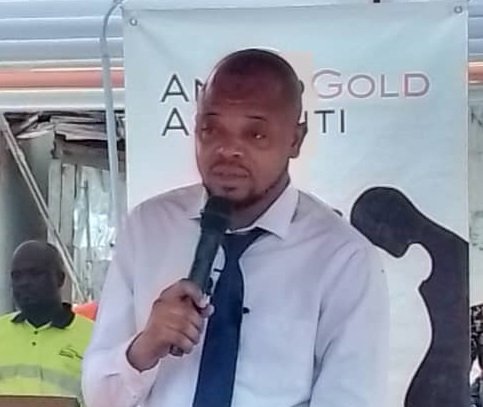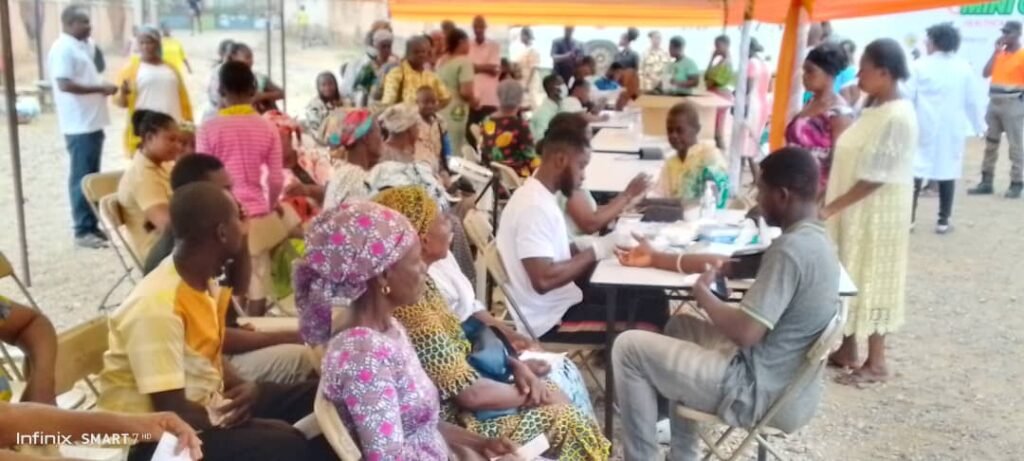News
Rise in kidney cases in Ashanti Region

A staggering 13.5 per cent of the population in the Ashanti region is affected by chronic kidney disease, according to Dr Suleiman Suabil, a Physician Specialist at Obuasi AngloGold Hospital.
Speaking at the World Kidney Day event organised by AngloGold Ashanti, Obuasi mine, Dr Suabil revealed that about 17.6 per cent of patients require dialysis in the Ashanti region.
“Globally, 10-14 per cent of the population is affected by kidney disease, with 14 per cent in Sub-Saharan Africa and 13.5 per cent in Ghana,” Dr Suabil disclosed.
He noted that kidney disease was a silent killer, with many people unaware of their kidney status until it’s too late. “Most people admitted to medical wards have chronic kidney disease, but only one out of 10 people are aware of their kidney status.”
Dr Suabil identified diabetes, hypertension, unhealthy lifestyle choices, excessive alcohol consumption, smoking, unhealthy diet, abuse of herbal medication, lack of exercise, and excessive weight gain as major causes of chronic kidney disease.
The World Kidney Day event, held at Obuasi-Anyinam in the Ashanti region, included free health screening and education sessions on kidney health.
Mr Emmanuel Masseh, representing Edmund Oduro Agyei, AGA-Obuasi Mine Community Relations Manager, emphasised the importance of preventive healthcare measures.
“Through our outreach programmes, we aim to bring quality healthcare to the doorsteps of our communities,” Mr Masseh said.
“Events like this mini clinic empower the public with knowledge to protect their health and seek medical assistance when needed,” he added
The event was supported by partners including Nananom, Anyinam Community, AGA Health Foundation, Otumfuo Health Foundation, Ghana Health Services, and Quantum.
As Ghana grapples with the alarming rise in kidney disease cases, events like World Kidney Day serve as a reminder of the importance of prioritising kidney health and promoting preventive healthcare measures.
From Kingsley E. Hope, Obuasi
News
Prioritise affordable treatment of sickle cell treatment —Health Expert

Health experts have urged Ghana to prioritise affordable and accessible treatment for sickle cell disease (SCD) as advanced, but costly curative therapies remain out of reach.
SCD, an inherited blood disorder, affects about three in every 100 newborns in Ghana.
Globally, around 1,000 babies are born with the condition daily, with three-quarters in sub-Saharan Africa.
The disease causes severe complications including chronic pain, anaemia, infections, strokes and organ damage, often leading to shortened life expectancy.
In recent years, gene therapy has been developed as a potential cure.
However, its cost—running into millions of dollars per patient—makes it financially and technically inaccessible in Ghana.
According to Dr Lawrence Osei-Tutu, a Sickle Cell and Childhood Cancer Expert at the Komfo Anokye Teaching Hospital, “the country must instead focus on practical, lower-cost interventions such as hydroxyurea”, a decades-old cancer drug proven to reduce painful episodes, hospitalisation and life- threatening complications in SCD patients”.
Taken orally, the medicine improves red blood cell function and is considered safe and effective.
“Hydroxyurea therapy is as good as the cure and a low-hanging fruit to pluck, we must bring a cure to our sickle cell warriors, but do so sustainably.” he urged.
In a chat with The Spectator here, he said to create awareness on the disease, the expert noted that despite its benefits, “hydroxyurea is not widely accessible in Ghana.”
Stressing that, “many patients either cannot afford it or struggle with irregular supply through the health system.”
Moreover, he argued that scaling up access would provide immediate relief while the country builds the infrastructure, trains specialists and secures funding needed to support curative therapies in the future.
With an estimated 15,000 babies born with sickle cell disease annually in Ghana, Dr Osei Tutu cautioned that “failure to improve access to effective treatment will leave many patients vulnerable to preventable complications and early death.”
From Kingsley E. Hope, Kumasi
Join our WhatsApp Channel now!
https://whatsapp.com/channel/0029VbBElzjInlqHhl1aTU27
Hot!
Let’s reintroduce Cultural Studies to complement educational reforms — Tourism Minister

Madam Abla Dzifa Gomashie, the Minister of Tourism, Culture and Creative Arts, has emphasised the importance of reintroducing Cultural Studies in schools as part of Ghana’s broader educational reform agenda.
She said Cultural Studies would complement existing efforts to reposition Science, Technology, Engineering and Mathematics (STEM) and Technical Vocational Education and Training (TVET) to promote digital literacy and expand Creative Arts education.
Speaking at the 2025 Homowo Festival of the people of Ningo-Prampram, held on the theme: “Education: The Best Legacy for our Children,” Madam Gomashie said cultural education was critical to national identity and development.
She noted that the festival’s theme aligned with the Government’s vision to transform education in Ghana and encouraged the youth to embrace it not only as a means of personal development but also as a way of preserving traditional values.
These values, including patience, wisdom, and hard work, were at the core of the Homowo celebration, the Minister said.
“Cultural festivals like Homowo are vital instruments for strengthening cultural identity, preserving historical memory, and fostering national unity. Additionally, festivals serve as platforms for educating the youth through storytelling, music, dance, and other traditional practices, while also providing opportunities for community engagement.”
Madam Gomashie highlighted the strong foundation that Ghana’s tourism was built on, which included culture, traditions, and the creative industry, collectively contributing to over GH¢4.8 billion to the economy.
“Festivals give tourists reasons to visit our country. Therefore, with the right infrastructure and the development of all the domains, the sector can do more than what has been recorded,” she added.
Mr Sam Nartey George, the Member of Parliament for Ningo-Prampram and Minister of Communication, Digital Technology and Innovation, commended the community for their vibrant participation in the festival. He announced plans for the construction of a new nursing training school in Ningo, aimed at expanding access to healthcare education in the area.
Nene Osroagbo Djangmah XII, Paramount Chief of Great Ningo Traditional Area; King Dr Tackie Teiko Tsuru II, Ga Mantse; Nene Tetteh Wakah III, Paramount Chief of the Prampram Traditional Area; Prof. Odaifio Welentsi III, Paramount Chief of the Nungua Traditional Area; Naana Dugbakuwor Dugba II, Paramount Queen Mother of Great Ningo; and Mr. Elvis Afriyie Ankrah, Special Envoy on Religion and Inter-Faith Affairs, who represented the Chief of Staff, were among dignitaries at the festival. -GNA






